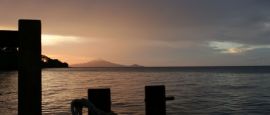Nicaragua Shopping and nightlife
Shopping in Nicaragua
Masaya Market is the handicrafts mecca, where you’ll find hand-embroidered clothing, woodcarvings and hand-woven cotton hammocks, much of it made by artisans from the surrounding villages. Look out for black pottery from Jinotega, coconut shell jewellery from the Caribbean coast and finely carved cups made out of jicaro gourds from Rivas as well.
Shopaholics will love Granada, where there’s everything from colonial-era antiques to high-end souvenirs and the work of local cooperatives, including hand-made jewellery and quirky bags made out of recycled materials. Wicker furniture, such as the ubiquitous rocking chairs, is beautifully made but difficult to transport.
In the Solentiname Archipelago, you can pick up colourful primitivist paintings of the islands’ natural beauty direct from the artists, along with brightly painted balsa woodcarvings of birds and animals.
Esteli is the place to go if you’re hankering for a pair of hand-tooled leather cowboy boots. They come in every shade imaginable and can be custom-made in a couple of days. Smokers can pick up good quality cigars too, including organic brands, hand rolled in the region’s tobacco farms.
If you’re in Managua, head to the Roberto Huembes market, where there’s a wide selection of crafts from around the country. For a more sedate shopping experience, the Galerias, Metrocentro and Multicentro Las Americas malls have craft shops with higher prices than the markets plus a 15% sales tax, as do many of the high-end hotels.
Shops and shopping malls are usually open Mon-Fri 0900-1900 and Sat 0900-1800. Markets open Mon-Sun 0900-1800.
Keep an eye on your belongings at crowded markets. Prices aren’t generally marked up but if you want to haggle, you might get a discount of around 5-10%. There are few or no ATMs in rural areas and those that do have them often don’t accept Mastercard (or any card other than VISA), some retailers don’t accept credit cards, so carry cash. US dollars are usually accepted, as well as córdobas.
Nightlife in Nicaragua
Sociable Nicaraguans love nothing better than to go out to eat and drink, often in large groups. Dancing is always on the agenda and discotecas – from glitzy clubs to dingy bars – play everything from hip-hop to salsa, merengue and booty-shaking reggaetón. If you don’t know your left foot from your right, there are often classes available.
Bars and cafés open by the week in Granada, from sophisticated cocktail bars in colonial courtyards (usually on the west side of the plaza), to more rustic beer joints on the lakeshore.
Student-filled León is bursting with bars that are open late most of the week, especially around the Teatro Municipal. Some even have a cultural slant, with poetry readings and discussions. Conversely, try laidback San Juan del Sur – its main strip has a party feel, with happy hour cocktails, open mic nights, film nights, DJ's and live bands. For the more adventurous partier, San Juan’s ‘Sunday Funday’ is not to be missed, and involves a hostel crawl all the way up to Naked Tiger hostel.
Managua’s Zona Rosa is the up-and-coming party district, with clubs, bars, restaurants, clubs and a casino. The Zona Viva, around the Galerías Santo Domingo shopping mall, is another popular bar-hopping spot.
In rural areas, the drinking dens are more homespun and male oriented, and it’s not Saturday night without a fight, so don’t hang around until the bitter end.
Theatre is underfunded and limited but León, Granada and Managua’s theatre are the places for performance arts. You’re more likely to catch a dance troupe at one of the many saint’s days and festivals.




 You know where
You know where